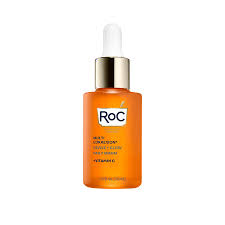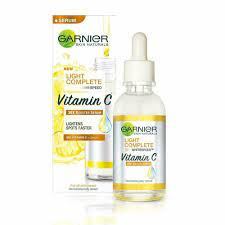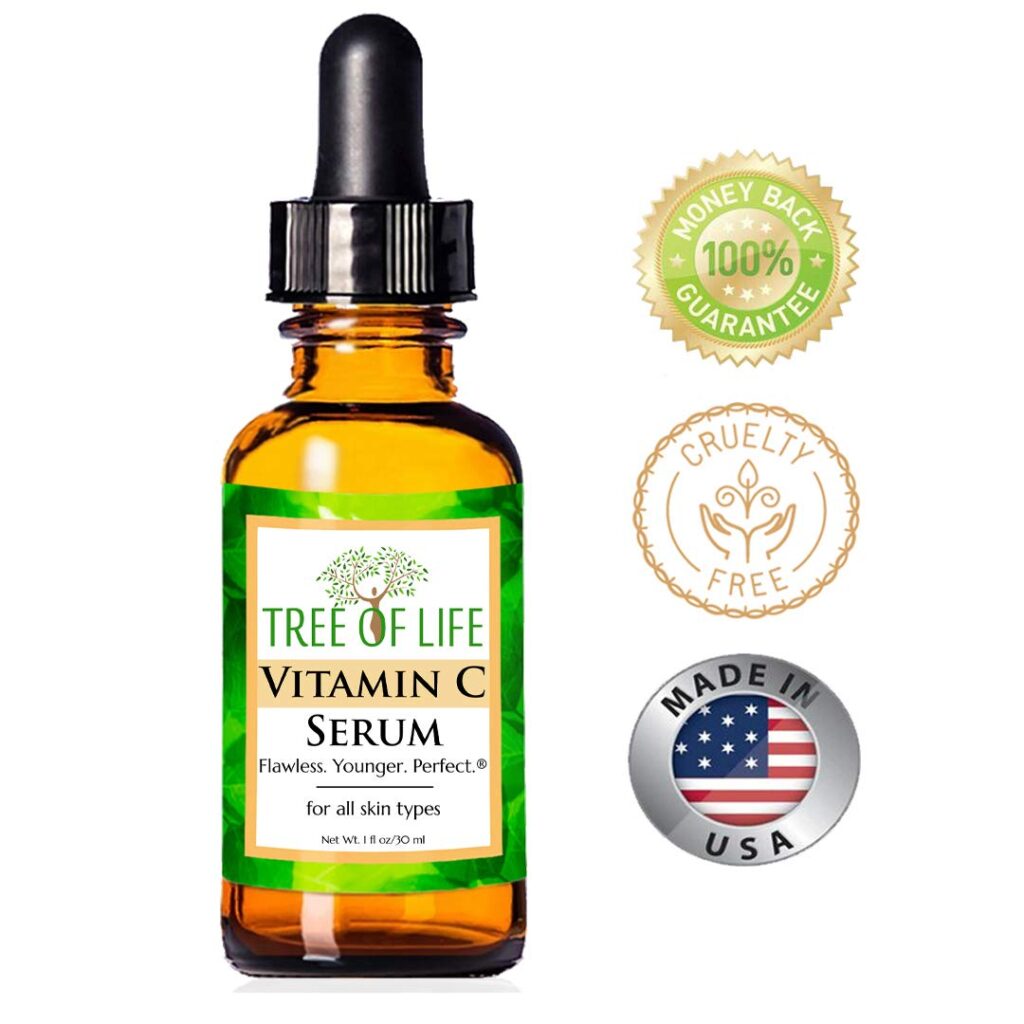Last Updated on 1 year by Francis
Contents
Does Vitamin C Serum Really Work on Your Face?

If you’re looking for a way to improve the texture of your skin, then you may have heard that a vitamin C serum can do wonders. But are you sure if it’s the right thing for you?
Does vitamin C serum actually work on your face?
If you have ever considered using a vitamin C serum, you might wonder if it really works for your skin. Vitamin C is a powerful antioxidant that can be used on the face to boost collagen and reduce inflammation. It can also improve the appearance of fine lines, hyperpigmentation, and dullness.
However, it’s important to know that vitamin C is not a cure-all. You may experience side effects such as redness, irritation, and breakouts. To avoid these, make sure the product you buy contains only research-backed forms of vitamin C.
Vitamin C is most effective when paired with another antioxidant, such as hyaluronic acid. Hyaluronic acid helps maintain moisture in the skin, which is essential for preventing dryness.
A vitamin C serum is a great addition to any skincare regimen. Depending on your skin type, you can apply it twice a day or even nightly. But be aware that it can take weeks to notice any results.
A vitamin C serum can reduce pore size, increase collagen, and correct uneven tone and texture. They can also help reduce acne scars and dark spots.
How long does it take for a vitamin C serum to wor
Vitamin C is a nutrient and antioxidant that helps improve skin tone and elasticity. It also prevents free radical damage. However, its effects can take some time to show.
The most efficient way to get the most benefit out of vitamin C is by using it consistently. You can find vitamin C in several skincare products. One of the best ways to use vitamin C is by applying a serum. When selecting a vitamin C serum, it’s a good idea to choose a product that is a research-backed form of the nutrient.
Vitamin C is a safe and effective ingredient that can be found in many serums. However, it can sometimes lead to irritation and breakouts. So be sure to test a sample before applying it to your face.
One of the best things about vitamin C is its ability to protect your skin from the damaging effects of UV radiation. Studies have shown that applying a serum containing vitamin C can help to protect your skin against the sun’s harmful rays.
If you have a bit of money to spend on a serum, it can be a wise investment. A serum containing the vitamin C will help to improve the look and feel of your skin.

A brief background of Vitamin C
Vitamin C contains essential nutrients that are powerful antioxidants. Vitamin C can have an impact on your overall health. It helps protect against toxins in our blood, and protects the immune system from free radicals. The nutrients protect the bone tissue and skin by strengthening the teeth and bone. Almost every plant and animal can produce their own vitamins, sadly humans lack this ability. We need vitamin C through diets or supplementation too. Vitamin C is widely studied.
Benefits of Vitamin C Serum
It doesn’t surprise anyone if most skin care products include vitamin C in their formulas. Face serums are unique because they contain a very low dose of vitamin C. In addition a clinical study shows topical acclaim of vitamin C has more effective effects on the body than oral consumption. Tell me the benefits of vitamin C serums on your skin. Vitamin C is an effective and safe treatment for enhancing collagen production. In fact, the cell’s function stimulates the proliferation of fibrose tissue. Fibroblasts are one of the most commonly used cell types of connective tissue and play the largest role in producing collagen and other collagens.

Is Vitamin C Serum Real?
We want the product to work. I am so sorry that you returned with such an amazing gift but then have to take half to waste. What are your skin care options? We have the vitamins C Serum. Can it be done? It was just a simple question that I answered. . Yeah! What is going to be the exciting news for us? Is there any benefit to skin health from skin care products? We should start by looking at some basics about vitamin C.
Tell me the importance of vitamin C?
Vitamin C can reduce free radical oxidation on your skin, according to board-certified dermatologist Patricia Wexler. It can also help to restore the skin’s natural healing abilities and protect your skin from free radical damage. So as antioxidants help fight oxidation, topical antioxidants help protect skin against daily toxins and pollutants.
How does vitamin C help skin?
Amazingly, vitamin C can help reduce the effects of acne. This product offers many additional skin-healing effects that can be stored in your medicine cabinet forever. The skin is stimulated to heal by increasing its elasticity by producing collagen and elastin. Topical vitamin E helps increase elasticity while reducing skin wrinkles.

How can you add vitamin C into your daily skin-care routine?
It’s no longer vitamin C that is used but a form that is applied,” she said. A good word is acetate or methylascorbic acid. The dermatologists agree that serum is the most effective vitamin-based skincare product for skin, as serum is more effective than cream. Vitamin E can also help in protecting the skin.
Are vitamin C serum worth it?
Vitamin C has been found as a good antioxidant for preventing aging and sunburns as well as for preventing acne prone skin and hair. It can even be used as a sunscreen for the face and hair. If someone experiences skin problems, they should consider applying Vitamin C serums.
How long does it take for vitamin C serum to work on skin?
Is vitamin C necessary for the body’s health? Typically you should feel better in 4-5 weeks following the first daily dose of vitamin C.
What does vitamin C serum do for your face?
Vitamin C acts as an antioxidant and stimulates your body’s collagen production. This product is effective in fighting lines, brightening your skin and offering many benefits too. It is considered a top anti-aging drug that is effective for skin health and aging.

Can I use vitamin C serum on my face everyday?
Vitamin B serum can be administered primarily once to two days a week. The best rule is to clean, tone, apply vitamin B serum and moisturize. Make sure that you use a washcloth for the face.
Topical vitamin C is a science-backed, dermatologist-favorite ingredient that may help slow early skin aging, prevent sun damage, and improve the appearance of wrinkles, dark spots, and acne.
Applying topical vitamin C can combat free radicals and may improve the skin’s overall appearance. Skin benefits of vitamin C A few clinical studies have demonstrated that vitamin C can improve wrinkles. One study showed that daily use of a vitamin C formulation for at least three months improved the appearance of fine and coarse wrinkles of the face and neck, as well as improved overall skin texture
Are vitamin C serum worth it?
Topical vitamin C and the skin: Mechanisms of action and clinical applications.
As far as your skin is concerned, vitamin C is “a potent antioxidant that can neutralize free radicals.
This serum pairs sodium ascorbyl phosphate with hyaluronic acid (to draw water into the skin). This form of Vitamin C is also relatively stable, water soluble and may also help to reduce breakouts.
Vitamin C is an antioxidant that helps protect your skin from environmental damage. It can also help you to improve your complexion and reduce the appearance of fine lines and wrinkles.
Vitamin C serums are a staple of many skincare regimens. They are available in several forms. You can choose from ascorbic acid, magnesium ascorbyl phosphate, and ascorbyl-6-palmitate.
While vitamin C is a wonderful antioxidant, there are some negative side effects. In some cases, ascorbic acid can cause irritation.
One way to avoid these problems is to look for a formulation that contains ferulic acid. Ferulic acid can help reduce the amount of work that your vitamin C serum needs to do. Moreover, ferulic acid can enhance the effectiveness of your serum.
Vitamin C serums are great for treating uneven skin tone and blemishes. But they may not be able to eliminate the problem entirely.
Another issue with vitamin C serums is that they can change the color and smell of your skin. This can be especially a problem if you are using them on your face.
When you apply vitamin C serum to the affected area, it works by promoting the synthesis of collagen. This is the protein that builds your skin structure and promotes healthy skin.
They prevent or reduce damage to our cells by neutralizing the production of highly reactive molecules called free radicals. In other words, antioxidants help keep our body and our skin cells healthy.

Can I use vitamin C on my face everyday?
One of the most popular ways to use vitamin C is in the form of a serum. Vitamin C serum is a hydrating and anti-oxidant product that works to brighten dull skin.
The good news is that vitamin C serum is safe to use. If you have sensitive skin, though, you may have an allergic reaction to the active ingredient. That’s why you should patch test a new product before putting it on your face.
Some people have found that using vitamin C on their skin can actually improve their acne, especially when paired with a moisturizer. Moreover, it can help to reduce hyperpigmentation, which is the production of darker patches on the skin. It also helps to improve the appearance of wrinkles, and it promotes collagen production, which can make your skin look more youthful.
As a general rule of thumb, vitamin C should be used twice a day to achieve its maximum benefits. Apply it in the morning, and at night before bed. This will give your skin enough time to absorb the active.
Vitamin C can be very acidic, and serums can cause skin irritation in some people, particularly in high concentrations.
What not to mix with vitamin C serum?
Vitamin C, also known as ascorbic acid, is one of the best skincare ingredients you can buy. It helps protect your skin against free radicals and pollutants, and also helps repair damaged cells. When used properly, it can improve your complexion, reduce discoloration, and even help heal blemishes. However, not all vitamin C products are created equally. In fact, it’s important to be careful about what not to mix with vitamin C serum.
Some of the most common things to avoid when mixing Vitamin C with other skincare ingredients are AHAs, BHAs, and retinol. Also, beware of hyaluronic acid. Since hyaluronic acid is an acid, it’s recommended that you apply it after the serum, and not before it.
If you have sensitive skin, it’s best to use a lower concentration of Vitamin C. While Vitamin C is a strong antioxidant, it can irritate the skin. So, if you have any concerns, consult your doctor or dermatologist.
For best results, the pH level of your Vitamin C product should be around 3.5 or below. This will ensure that the product gets into the deepest layers of your skin, while helping it absorb better.
In the case of vitamin C serum, the active ingredient, vitamin C, works as an antioxidant that reduces damage due to ultraviolet radiation from sun exposure — such as hyperpigmentation, aging, and sunburn, when used in combination with sunscreen
Should I use retinol or vitamin C?
Retinol and vitamin C are two powerful ingredients that you can use in your skincare routine. Both are known for their antioxidant properties, which help to protect your skin from the sun’s harmful rays. Adding these ingredients to your routine can help to reduce the appearance of fine lines and wrinkles, while promoting healthy cell turnover.
While retinol and vitamin C may work well together, they can also be very irritating. This is because they have different pH levels.
The best way to avoid irritation from combining the two is to alternate the products in your daily skincare routine. In particular, dermatologists recommend using a retinol product at night and a vitamin C serum during the morning. If you have sensitive or acne-prone skin, this can help to avoid any potential reactions.
However, the effectiveness of retinol and vitamin C can be compromised by layering them. In addition, if you are using an acidic pH for vitamin C absorption, it may cause the retinol to destabilize.
To avoid this, you should keep your retinol and vitamin C separate. It is recommended that you start with a small amount of retinol and then increase your application as needed.
Can I leave vitamin C serum on my face overnight?
Vitamin C serum is an excellent antioxidant and works to brighten your skin while helping to reduce fine lines and wrinkles. It also soothes sunburns and can help to heal wounds. However, there are many serums on the market and not all of them are created equal.
To get the most out of your vitamin C serum, you should find one that is formulated with a high concentration of L-ascorbic acid. This is the best type of vitamin C for topical use. Other antioxidants can help to increase the stability of your vitamin C serum, thereby increasing its effectiveness.
In addition, make sure to look for a serum that features a proprietary delivery system. A good example of this is the Intra-Dermal SystemR from Viver. The patented delivery system enables the potent ingredients to penetrate all of the skin layers.
When looking for the right vitamin C serum for your needs, it is important to consider your skin’s age, ethnicity and lifestyle. For example, people with darker skin tones are more likely to develop hyperpigmentation.
Do dermatologists recommend vitamin C serum?
A vitamin C serum is a good way to improve your skin’s radiance. Vitamin C is a powerful antioxidant that protects your skin from free radicals. It can also help you to smooth out fine lines and wrinkles.
There are several types of vitamin C, including L-ascorbic acid, which is the most active form. If your skin is sensitive, it is a good idea to find a lower concentration. You may also want to use a patch test to make sure you don’t have an allergic reaction.
In addition to helping with hyperpigmentation, a vitamin C serum can help to smooth out fine lines and wrinkles. This is because it has the ability to stimulate collagen production.
When looking for a vitamin C serum, you should look for a formulation that is oil-free and water-soluble. This will allow the product to penetrate the deeper layers of the skin.
When you apply a vitamin C serum, you should use a gentle upward motion. You should also be careful not to irritate the area with any of the acids.








